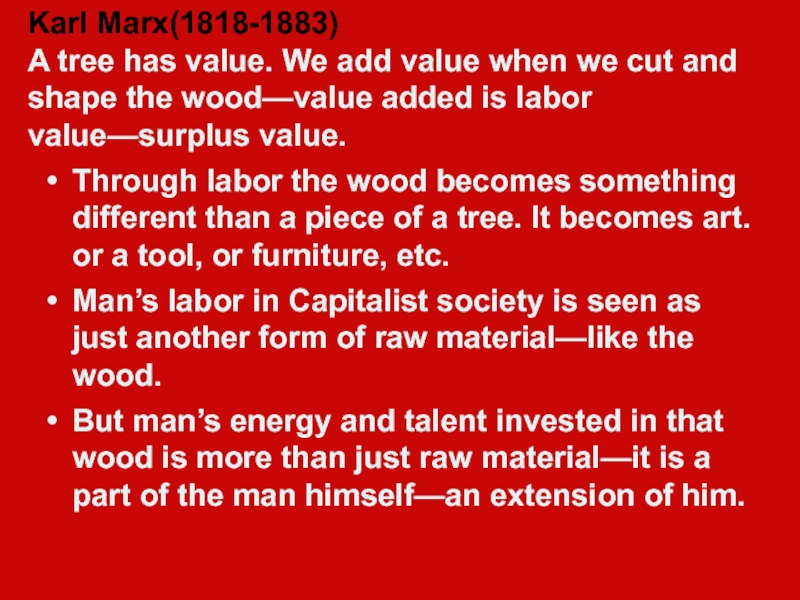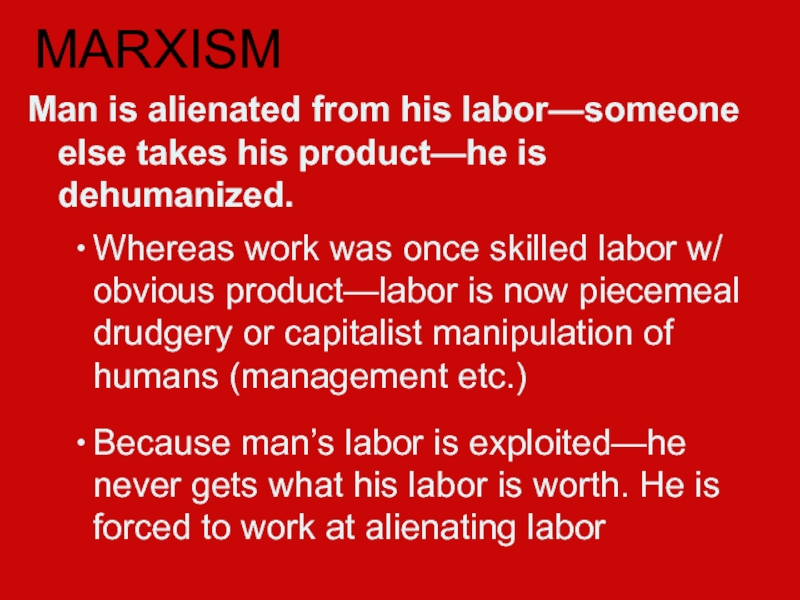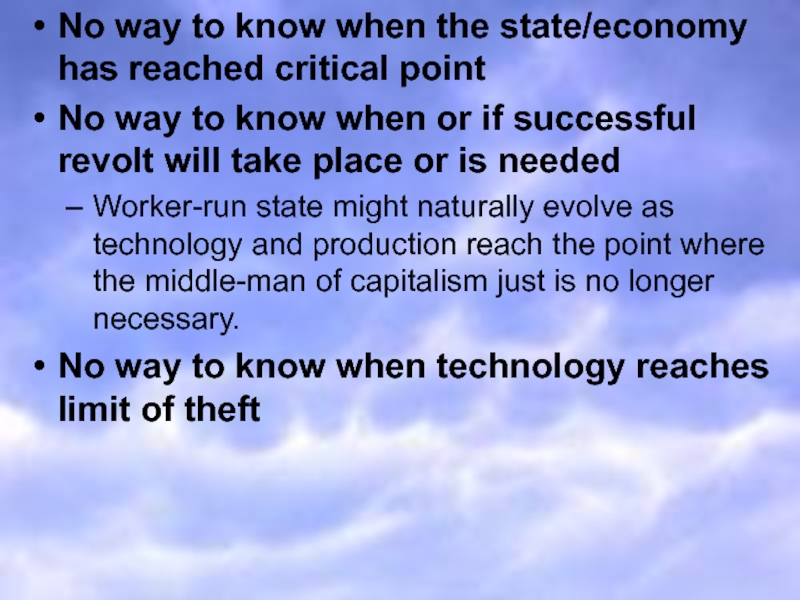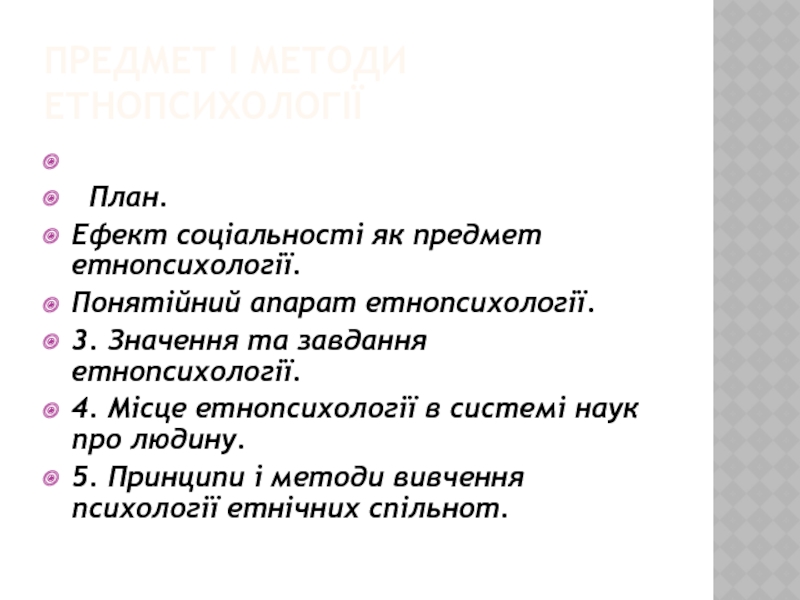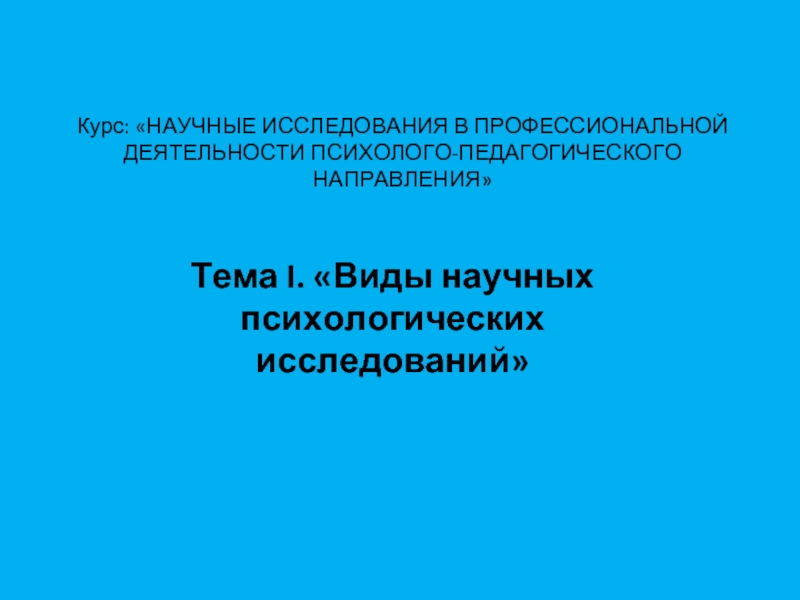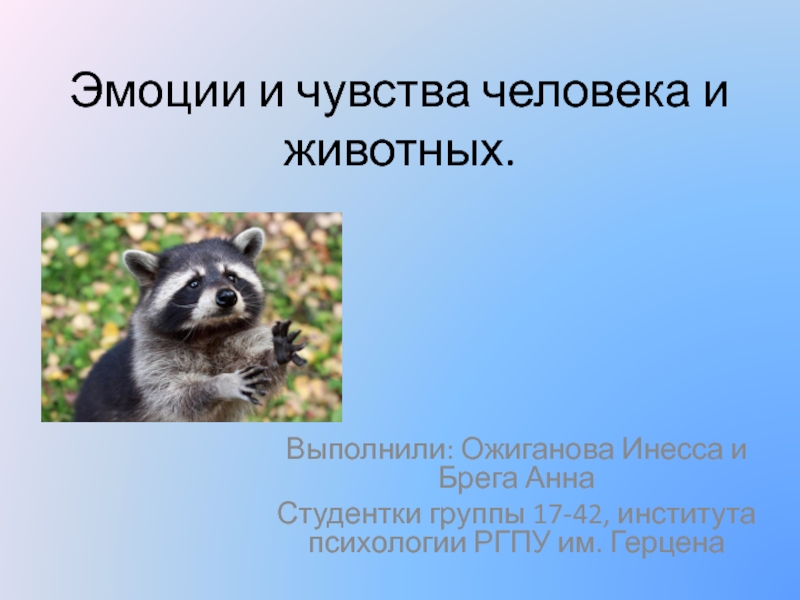- Главная
- Разное
- Дизайн
- Бизнес и предпринимательство
- Аналитика
- Образование
- Развлечения
- Красота и здоровье
- Финансы
- Государство
- Путешествия
- Спорт
- Недвижимость
- Армия
- Графика
- Культурология
- Еда и кулинария
- Лингвистика
- Английский язык
- Астрономия
- Алгебра
- Биология
- География
- Детские презентации
- Информатика
- История
- Литература
- Маркетинг
- Математика
- Медицина
- Менеджмент
- Музыка
- МХК
- Немецкий язык
- ОБЖ
- Обществознание
- Окружающий мир
- Педагогика
- Русский язык
- Технология
- Физика
- Философия
- Химия
- Шаблоны, картинки для презентаций
- Экология
- Экономика
- Юриспруденция
Objective midterm exam review презентация
Содержание
- 1. Objective midterm exam review
- 2. AESTHETICS METAPHYSICS ETHICS COSMOLOGY PHILOSOPHY
- 3. WHAT IS ETHICS/morality Standards that distinguish between
- 4. WHY PHILOSOPHY FOR COMPUTER ETHICS Ethics
- 5. WHAT ETHICS IS NOT ETHICS IS NOT
- 6. WHAT ETHICS IS NOT ETHICS IS NOT
- 7. RIGHTSa justified claim to a certain
- 8. In a natural state all were equal
- 9. RIGHTS a justified claim to a certain
- 10. Positive rights rights to have actions done
- 11. Robert Nozick (1938-2002) —extreme LIBERTARIANS
- 12. UTILITARIANISM Jeremy Bentham (1748-1832)
- 13. UTILITARIANISM--promote consequences that bring the greatest good
- 14. John Stuart Mill--(1806-1873) – (like a son
- 15. RULE VS ACT UTIL. act utilitarians--
- 16. Ethical Theories & Principles-- KANTIAN ETHICS Immanuel Kant—German philosopher 1724-1804 Non-consequentialist
- 17. Background for Kant’s Ethics- David HUME
- 18. KANT’S ‘IS-OUGHT DERIVATION’ Reason-Rationality is -
- 19. KANT’S CATEGORICAL IMPERATIVE CATEGORICAL means no
- 20. categorical imperative. [version 1] VERSION 1--
- 21. KANT’S CATEGORICAL IMPERATIVE --VERSION 2 VERSION 2
- 22. Ethical Theories and Principles--JUSTICE JUSTICE:--
- 23. Ethical Theories and Principles--RAWLS JOHN RAWLS--1921-2002
- 24. RAWLS’ ORIGINAL POSITION—a society that doesn’t
- 25. ORIGINAL POSITION-- Rational agents under a veil
- 26. Ethical Theories and Principles-- VIRTUE ETHICS
- 27. CARING ETHICS--WEAK SENSE OF CARING -our relationships
- 28. -STRONG SENSE OF CARING Background Hume—no
- 29. STRONG SENSE OF CARING We care
- 30. Adam Smith-[1723–1790] market economy with law
- 31. John Locke( 1632-1704) MARXISM (BACKGROUND) Property
- 32. Karl Marx(1818-1883) A tree has value. We
- 33. In Capitalism, Man’s labor is stolen. He
- 34. Man is alienated from his labor—someone else
- 35. Frederick Engels (1820-1895) Engels , like Marx,
- 36. ENGELS describes the booms/busts we have become
- 37. Engels predicts ever-increasing role of machine to
- 38. In the end, when the state and
- 39. No way to know when the state/economy
Слайд 2AESTHETICS METAPHYSICS ETHICS COSMOLOGY
PHILOSOPHY
ARTS
SCIENCES
SOCIAL SCIENCES
HUMANITIES
PHILOSOPHY
ETHICS
Renaissance
Studying the very basis of a subject is
WHAT IS PHILOSOPHY
GREEK ROOTS ---LOVER [PHILO] WISDOM [SOPH]
PHILOSOPHY is—QUESTIONING
PHILOSOPHY is QUESTIONING/ CLARIFYING LIMITS/VERY BASIC TENETS OF A SUBJECT
Слайд 3WHAT IS ETHICS/morality
Standards that distinguish between right and wrong, good and
applied ethics studies ethical dilemmas, issues, and questions as they arise in various practical or professional contexts;
normative ethics studies general theories and principles of ethics that can be applied to practical situations;
meta-ethics studies the meaning of ethical concepts, theories, and principles.
Слайд 4WHY PHILOSOPHY FOR COMPUTER ETHICS
Ethics is not a science [no answers,
Philosophers never in it for the money—you get to see what left wing folks think about business of technology.
Philosophers do logic—clear paths to discussion, persuasion, and argumentation—giving you a voice when you need to raise ethical issues
Teach you to QUESTION your own assumptions
about your ethics
Слайд 5WHAT ETHICS IS NOT
ETHICS IS NOT LAW
Laws
--standards of conduct enforced
Laws usually reflect many of a society’s moral values.
Laws give us society’s rules of ethical conduct..
Laws can even change a society’s moral values
Laws, however, are not ethics
Often, rules of law are a minimum of ethical conduct.
Some actions may be legal but unethical
Some actions may be ethical but illegal.
Слайд 6WHAT ETHICS IS NOT
ETHICS IS NOT SOCIAL CODE
Relativism --ethical standards are
Ethics is mere social convention or custom
BUT, ETHICS IS NOT
MERE SOCIAL CONVENTION OR CUSTOM.
Relativism does not allow for a global human culture
Relativism does not allow for ethical progress
Relativism does not allow for criticism of one’s own
culture’s ethical practices
Слайд 7RIGHTSa justified claim
to a certain kind of treatment from others
Thomas
man in a state of nature has the right to do what is necessary to protect himself and to get what he can get however he can get it—every man for himself.
But this is not a desirable life for most, so men give up their natural right to those [government.] who contract to bring peace and protection.
Слайд 8In a natural state all were equal and independent, and none
Humans in State of Nature are cooperative--opposite of Hobbes’ view.
Also, Govt. does not over-ride society or individual rights—govt. must be accountable.
Property & value are created by LABOR.
When we mix our labor with the natural world, we blend part of ourselves with that labor—that’s how we come to own property, ethically.
John Locke (1632-1704)
Слайд 9RIGHTS a justified claim to a certain kind of treatment from
Human Rights --all human beings have some basic moral rights—
right not to be killed
the right not to be harmed
the right to liberty
Rights entail duties. No duty, no right.
Declaration of Independence—specifies inalienable rights—to life, liberty and pursuit of happiness.
Prima facie rights- some rights contradict, given certain circumstances, and when this arises, some rights become secondary and are then obviated
Слайд 10Positive rights
rights to have actions done for us
food
clothing
shelter.
Negative rights
rights to
Free speech
let alone in the bedroom
not to be spammed
RIGHTS a justified claim to a certain kind of treatment from others--
to help from others or to be left alone by others.
Слайд 11Robert Nozick (1938-2002)
—extreme LIBERTARIANS hold that no one has positive rights.
Only time we can rightfully be forced to do something against our will is when we are forced to stop coercing others.
But this extreme libertarianism fails to see that, given so much freedom for everyone, then Hobbs’s state of nature would seem to follow
--one person’s freedom usually restricts someone else’s freedom
Слайд 13UTILITARIANISM--promote consequences that bring the greatest good for the greatest number
Consequentialism—examines the ethical results of an action, not the ethical mindset that caused the action
- Bentham--"the “pleasure principle"--the greatest happiness of the greatest number-- is the foundation of morals and legislation."
“The ability to suffer, not the ability to reason, be the benchmark of how we treat other beings.”
Слайд 14John Stuart Mill--(1806-1873) – (like a son to Bentham)
introduces a
”Better to a human miserable than a pig satisfied.”
Слайд 15RULE VS ACT UTIL.
act utilitarians-- consequences should be judged for
rule utilitarians--consequences should be judged in terms of rules that can be applied in general for similar cases.
Ethical Theories and Principles--UTILITARIANISM
Слайд 16Ethical Theories & Principles-- KANTIAN ETHICS
Immanuel Kant—German philosopher 1724-1804
Non-consequentialist
Слайд 17Background for Kant’s Ethics-
David HUME –British philosopher (1711-1776)
Hume was
He maintained we have no good reason to believe the sun will come up tomorrow.
In ETHICS Hume maintained that there is absolutely NO FACT we could learn about the world or about ourselves that COULD TELL US WHAT WE OUGHT TO DO or what we should VALUE.
Nothing about the way the world IS can tell what we OUGHT do.
This is known as the problem of ‘IS-OUGHT DERIVATION’
Kant’s ethics is an attempt to prove Hume wrong
Kant’s ethics is an ‘IS-OUGHT DERIVATION’
Слайд 18KANT’S ‘IS-OUGHT DERIVATION’
Reason-Rationality is - THE BIG TRUTH about us, the
Given this fact, that humans are Rational beings, does this tell us what we ought to do? If you are good at logic puzzles you’ll be impressed by how he gets to ought.
How to get to OUGHT? He thinks about it quite a bit, this is his life—and . . .
There is another truth to consider, what the word “OUGHT” really means.
“OUGHT” means a rule you must follow.
Слайд 19KANT’S CATEGORICAL IMPERATIVE
CATEGORICAL means no exceptions
IMPERATIVE means command, absolute must
CATEGORICAL
Since Kant is so into logic and reason, THE categorical imperative is a rule of logic and non-contradiction.
Слайд 20categorical imperative. [version 1]
VERSION 1-- act so that the maxim for
Notice what he has done here. He takes the concept of OUGHT as a rule that has to be followed, absolutely no exceptions, and he says, well, that IS what we ought to follow --rules that no RATIONAL person could disagree with—clever.
EXAMPLE--if murder is okay in one case, could you make it a universal rule? That means everyone one would murder everyone, always, but that’s not possible—there wouldn’t be anyone around to keep it up
.
EXAMPLE—if everyone lied all the time, then we’d all know they always mean the opposite of what they say, so nobody could lie.
greatest moral good can be “nothing else than
the conception of law in itself,
Слайд 21KANT’S CATEGORICAL IMPERATIVE --VERSION 2
VERSION 2 --treat all persons as ends
therefore
VERSION 2 treat all persons as ends and never merely as means
BUT be careful--almost impossible to prove version 2 as is
--you have to have a smoking gun
nothing can be called good without qualification except a good will
the good will—doing things out of sense of duty to do the right thing.
Слайд 22Ethical Theories and Principles--JUSTICE
JUSTICE:-- treat equals equally, unequals unequally
3
COMPENSATORY—fair compensation for loss due to wrong action of others.
RETRIBUTIVE—fair punishment or penalties for wrong-doers
DISTRIBUTIVE-- fairly distribute social & economic benefits and burdens
DISTRIBUTIVE JUSTICE: distribute benefits and burdens equally.
EGALITARIAN-there are no relevant differences among people
Distribute benefits and burdens equally
ARISTOCRACY
Distribute benefits according to merit
CAPITALIST
distribute benefits and burdens according to work effort
distribute benefits and burdens according to productivity
distribute benefits and burdens according to market demands
SOCIALIST (work effort & productivity can also be socialist)
distribute benefits according to need
distribute burdens according to ability
Слайд 23Ethical Theories and Principles--RAWLS
JOHN RAWLS--1921-2002
RAWLS CONTRACT THEORY –JUSTICE AS FAIRNESS
hypothetical
Counterfactual-an imaginary situation used to persuade in favor of a theory
RAWLS’ VEIL OF IGNORANCE
Imagine a group of people assembled in a room to create a goverrnment and laws
Imagine also that everyone in this group has severe amnesia and cannnot see themselves or others
They also cannot feel themselves or others
Слайд 24
RAWLS’ ORIGINAL POSITION—a society that doesn’t start w/ prejudice
—color-blind, class-blind, blind
Rawls maintains that if we made laws & governments, or if we examined fairness under this veil of ignorance, we would logically end up with his system
Bridges ‘suppose’ to ought
Слайд 25ORIGINAL POSITION-- Rational agents under a veil of ignorance would agree
PRINCIPLE 1. Each person has equal RIGHT to most extensive LIBERTIES compatible w/ liberties for all—(negative rights)
We’d be concerned that we all get enough basic freedom
PRINCIPLE 2. Distribute benefits and burdens so that both :
B. Offices and positions are open to all—EQUAL OPPORTUNITY
We’d be concerned that we have chance to having some control over what happens—if we want to have that control
A. GREATEST BENEFIT possible arises for the least advantaged
We’d be afraid we might be the worst off, so we’d want to make those as well off as we could
PRINCIPLE 1 over-rides PRINCIPLE 2-we’d be most concerned that we get basic liberty
B over-rides A.—chance to improve –hope to rise above being at the vvery bottom is more important than being a little better off at the very bottom.
Слайд 26Ethical Theories and Principles-- VIRTUE ETHICS
VIRTUE ETHICS we should develop
Some virtues—
courage honesty charity
humility patience loyalty
justice forgiveness integrity.
Aristotle –Ancient Greek Philosopher
Aristotle’s ethics-- -virtues come from habit-
habit comes from-- education, training, and practice
ARISTOTLE’S GOLDEN MEAN --a balance between extremes
“a mean between 2 vices, one of excess and the other of deficiency”
Example—[reckless=excess of courage] & [cowardice=deficiency of courage]
Non-consequentialist
Aristotle’s main virtues—justice, courage, temperance, and prudence
Слайд 27CARING ETHICS--WEAK SENSE OF CARING
-our relationships with others bring special commitments
COMMUNITARIANISM we need community and we have responsibilities to our community.
Caring Relationships with individuals and with our communities matter, and can outweigh rights and utility.
problem—fine line between favoritism/prejudice and special commitments and regards for our caring relationships
Ethical Theories and Principles-- CARING ETHICS
Слайд 28-STRONG SENSE OF CARING
Background
Hume—no facts about the world can tell
Kant’s categorical. imperative—attempt to bridge the is-ought gap
STRONG SENSE of caring –bridging is to ought
caring for others is the foundation for ethical principles and theories.
For example,, we believe that people have the right to not be murdered because when someone is murdered, our ‘hearts go out’ to them—we sympathize with the pain, the needs, and the lives of others.
Ethical Theories and Principles-- CARING ETHICS
Слайд 29STRONG SENSE OF CARING
We care about other human beings.
We need
We ought to maximize happiness, observe rights and duties, because we care
Individuals need caring relationships and they need communities, even in state of nature,
So Hobbes’ view of state of nature is wrong.,
but
Our caring varies—some care more, some less .
Those who feel no such caring are missing the core of ethical value
We sympathize more for strangers who are most vulnerable, or most in need of caring from others.
Слайд 30Adam Smith-[1723–1790]
market economy with law of supply and demand is
utilitarian-everyone is better off-
but capitalists use any non-capitalist means to further their profit, breeding monopolies
making Smith wrong.
MARXISM (BACKGROUND)
Слайд 31John Locke( 1632-1704) MARXISM (BACKGROUND)
Property and value are created by labor.
When you combine your labor with raw materials, something of you is in the product.
Labor accounts for most of the property value of an object,
As long as you don’t waste this property, it’s yours
Money is durable property, doesn’t get wasted
Property precedes government and government cannot "dispose of the estates of the subjects arbitrarily."
+
Слайд 32Karl Marx(1818-1883)
A tree has value. We add value when we cut
Through labor the wood becomes something different than a piece of a tree. It becomes art. or a tool, or furniture, etc.
Man’s labor in Capitalist society is seen as just another form of raw material—like the wood.
But man’s energy and talent invested in that wood is more than just raw material—it is a part of the man himself—an extension of him.
Слайд 33In Capitalism, Man’s labor is stolen. He works 10 hours and
Machine makes labor more productive—where once it took 20 hours to make a shoe, with use of machines it takes 2 hours.
Worker is paid just what he needs to get by. He receives none of the extra value from productivity of his work.
Machinery is used to distance man from his labor—through assembly line, etc., he no longer can say—this is my work—it is work of a team.
Because worker doesn’t own the machine or the raw materials, he cannot directly claim the 5 hours extra that the capitalist keeps.
Слайд 34Man is alienated from his labor—someone else takes his product—he is
Whereas work was once skilled labor w/ obvious product—labor is now piecemeal drudgery or capitalist manipulation of humans (management etc.)
Because man’s labor is exploited—he never gets what his labor is worth. He is forced to work at alienating labor
MARXISM
Слайд 35Frederick Engels (1820-1895)
Engels , like Marx, predicts ever-increasing role of machine
Engels maintains that machine development & production causes supply/demand problems for capitalism
Technological innovation creates an army of unemployed
An army of unemployed means fewer who can afford the goods the capitalist produces—supply of products increases but demand for products falls
Слайд 36ENGELS describes the booms/busts we have become so familiar with in
The whole industrial and commercial world, production and exchange among all civilized peoples, are thrown out of joint about once every 10 years.
Commerce is at a stand-still
the markets are glutted
products accumulate
hard cash disappears
credit vanishes
factories are closed
bankruptcy follows upon bankruptcy
the mass of the workers are in want of the means of subsistence, because they have produced too much of the means of subsistence;. The stagnation lasts for years
Слайд 37Engels predicts ever-increasing role of machine to transform the conditions that
Engels predicts government eventually will evolve into a worker-owned state—advanced government allows for end of private property
State interference in social relations becomes, in one domain after another, superfluous, and then dies out of itself; The State is not "abolished". It dies out
Слайд 38In the end, when the state and capitalism are abolished, we
The government of persons is replaced by the administration of things, and by the conduct of processes of production.
Слайд 39No way to know when the state/economy has reached critical point
No way to know when or if successful revolt will take place or is needed
Worker-run state might naturally evolve as technology and production reach the point where the middle-man of capitalism just is no longer necessary.
No way to know when technology reaches limit of theft
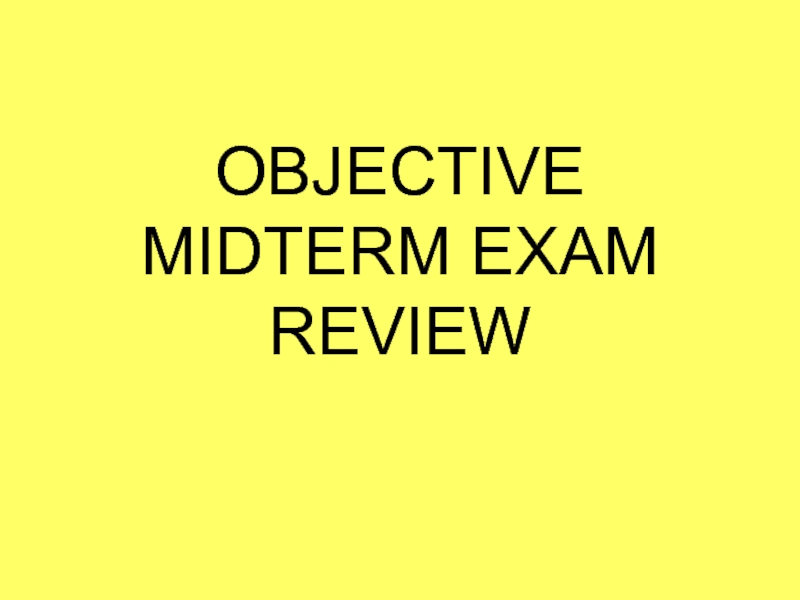
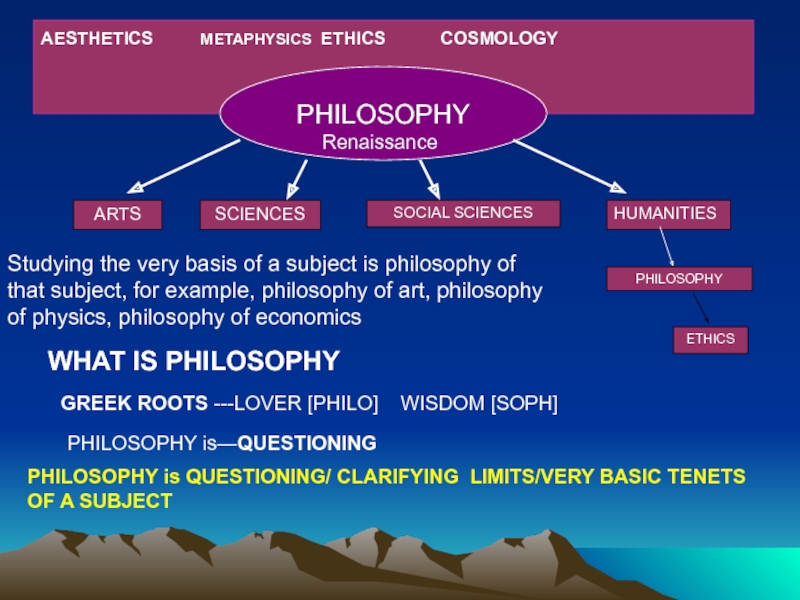
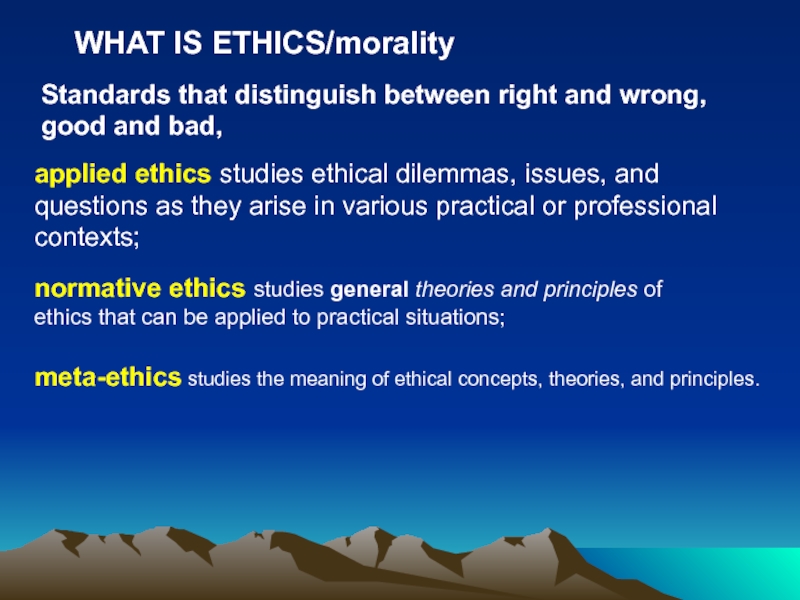
![WHY PHILOSOPHY FOR COMPUTER ETHICSEthics is not a science [no answers, just theories] so branch](/img/tmb/4/334894/bab4d078a8a5b4463963cda7cc8da1d7-800x.jpg)
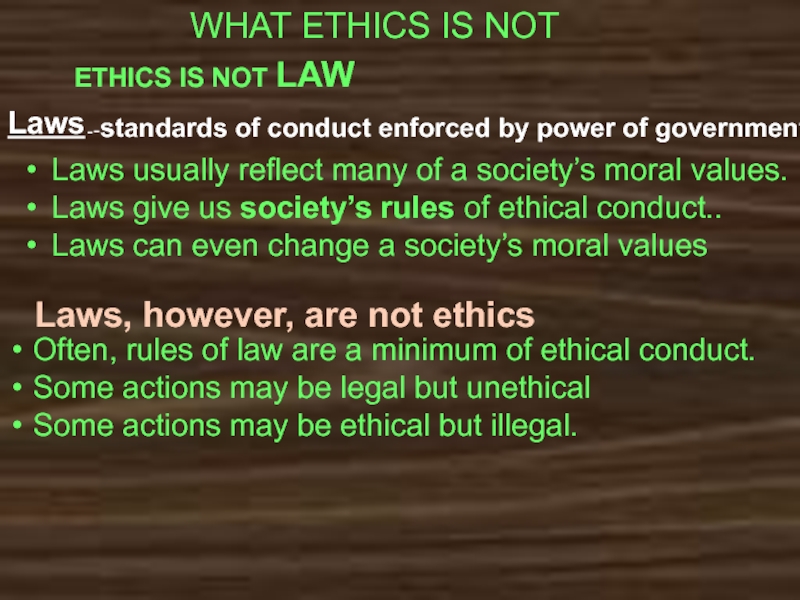
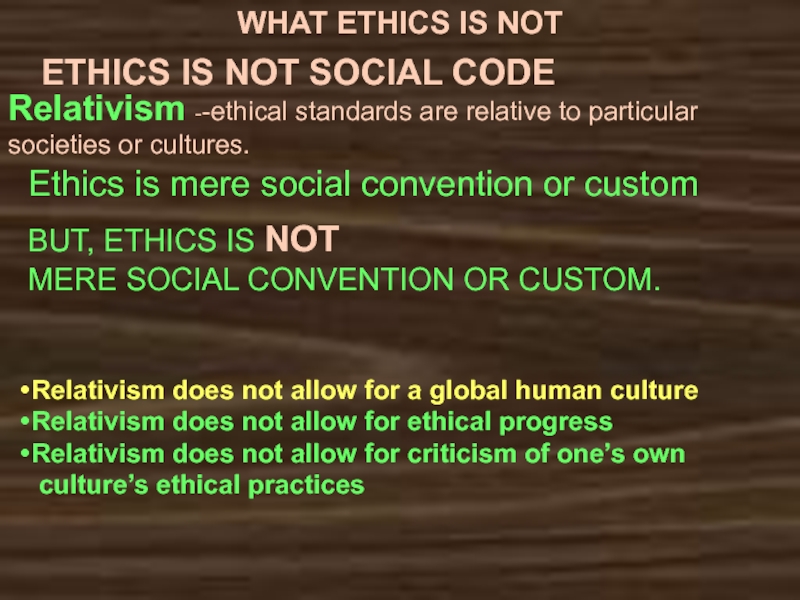
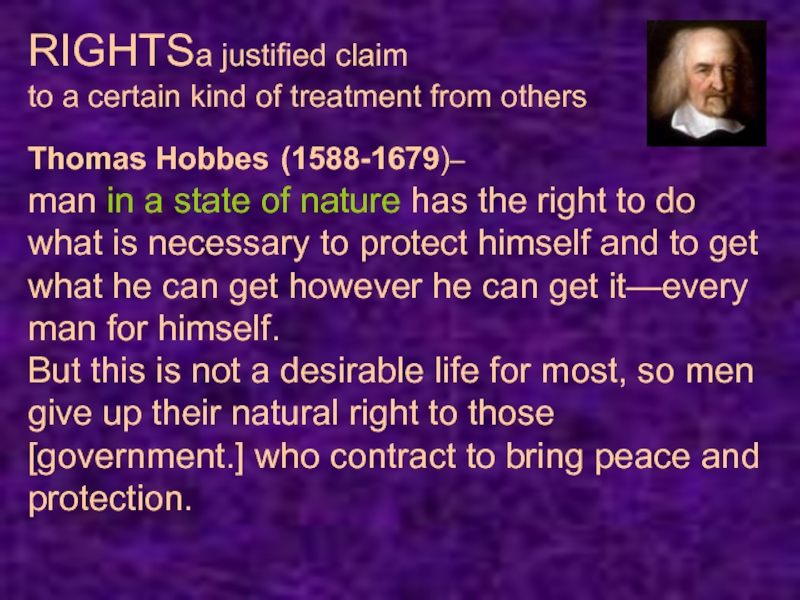
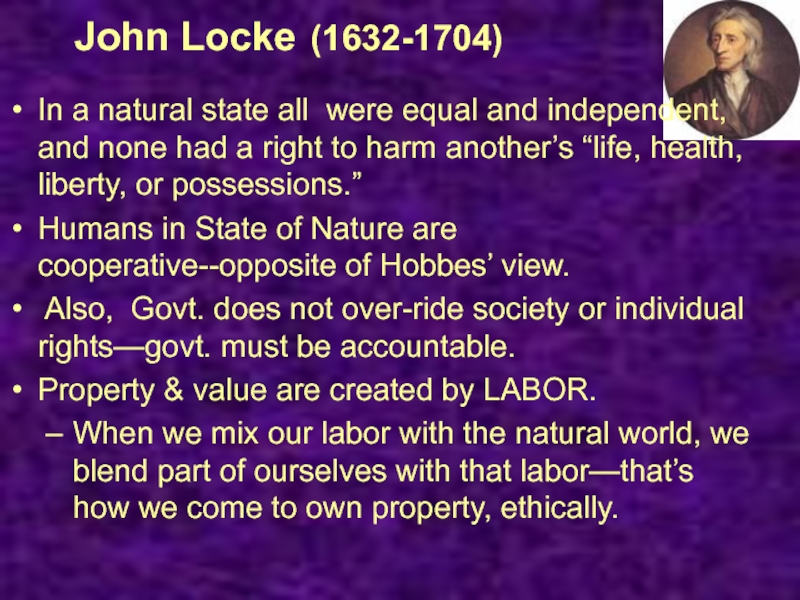
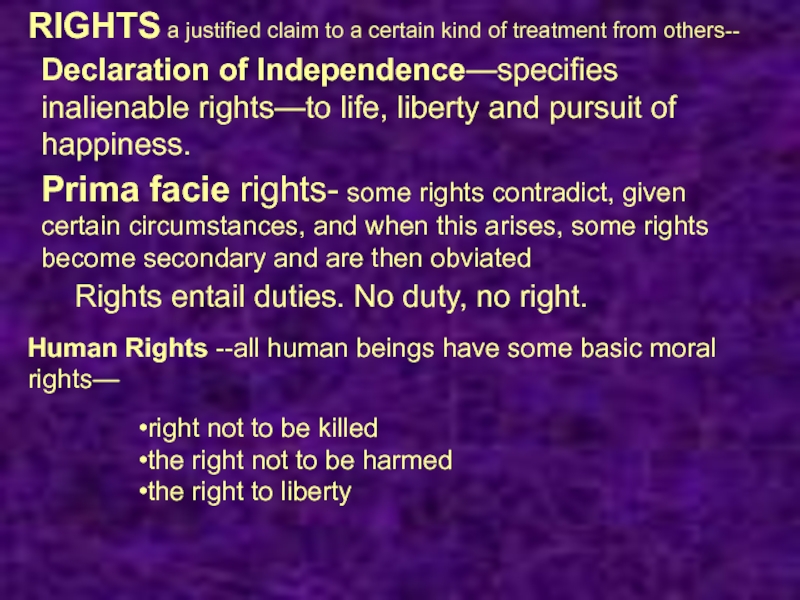
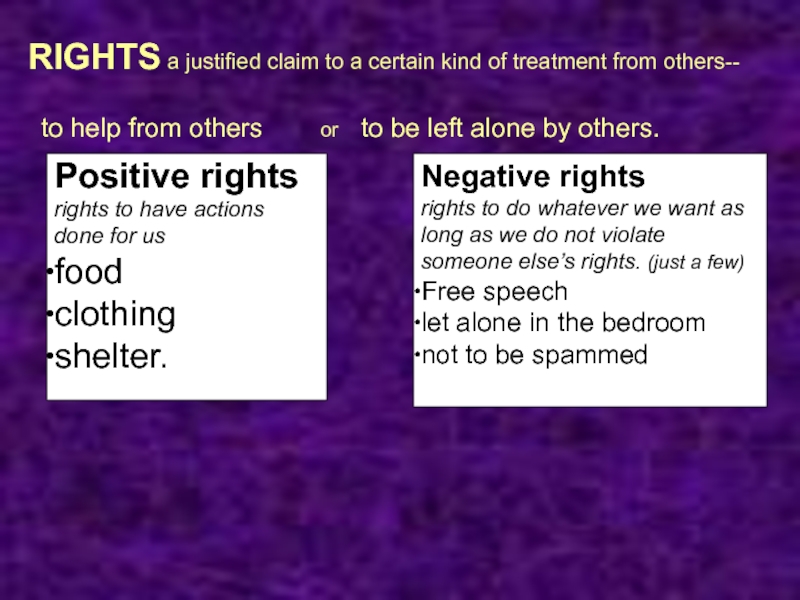
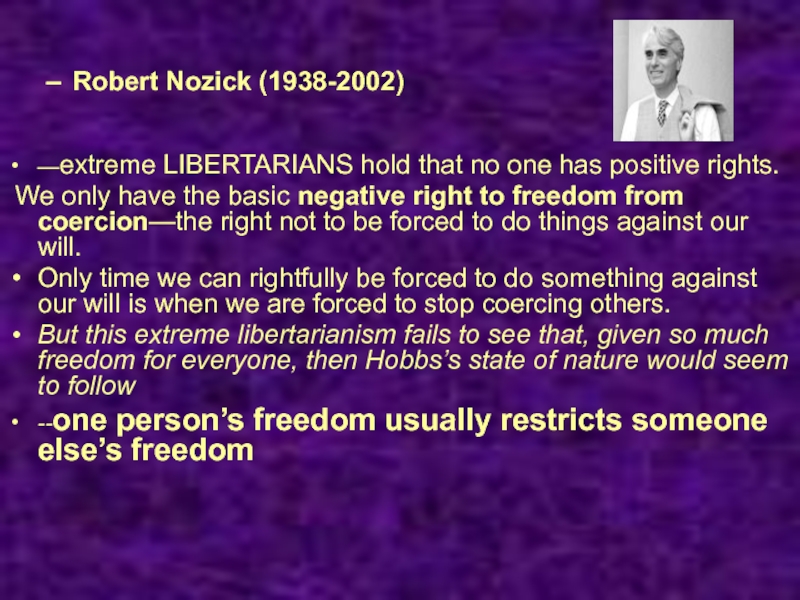
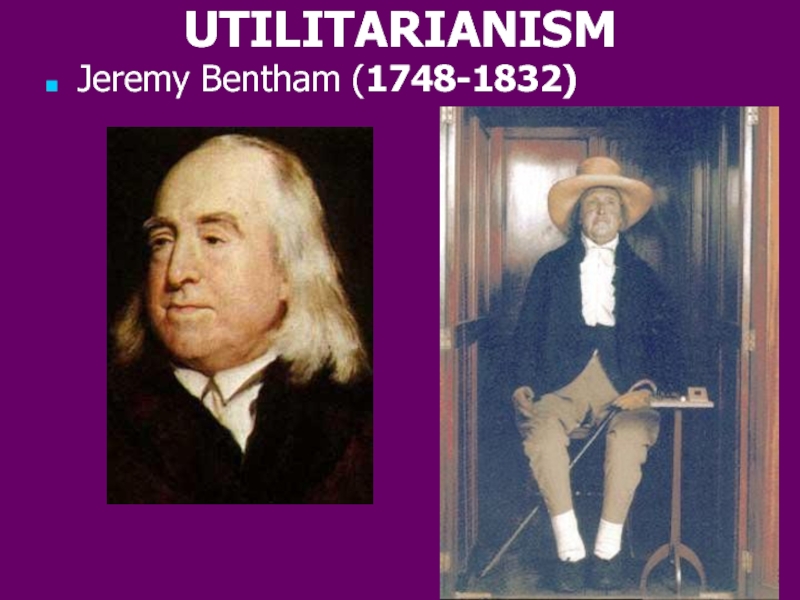
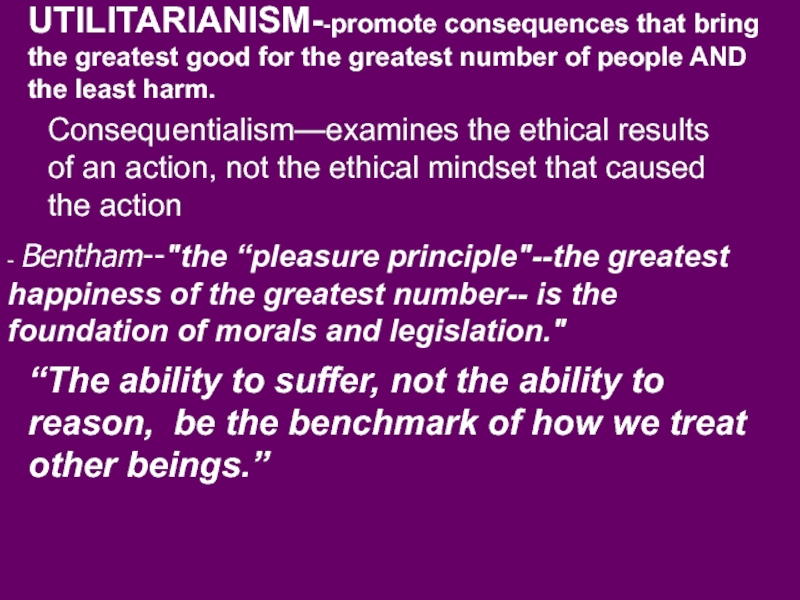
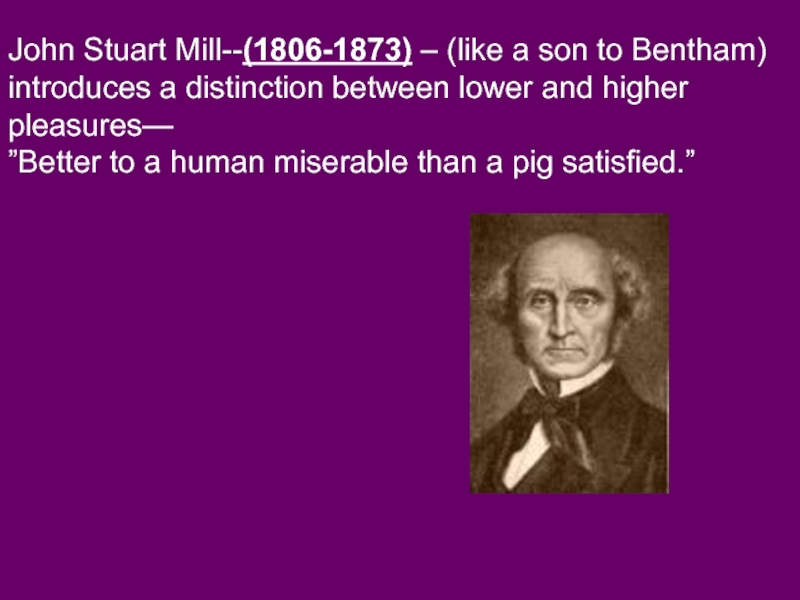
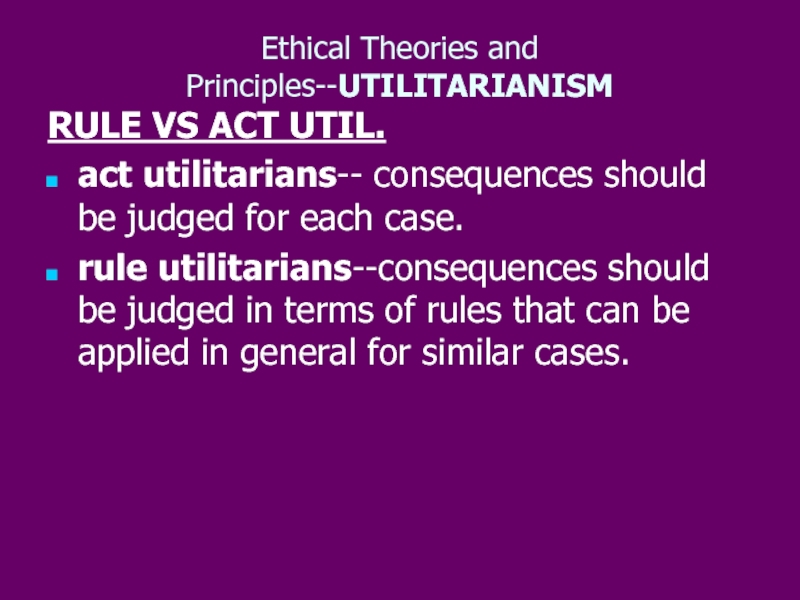
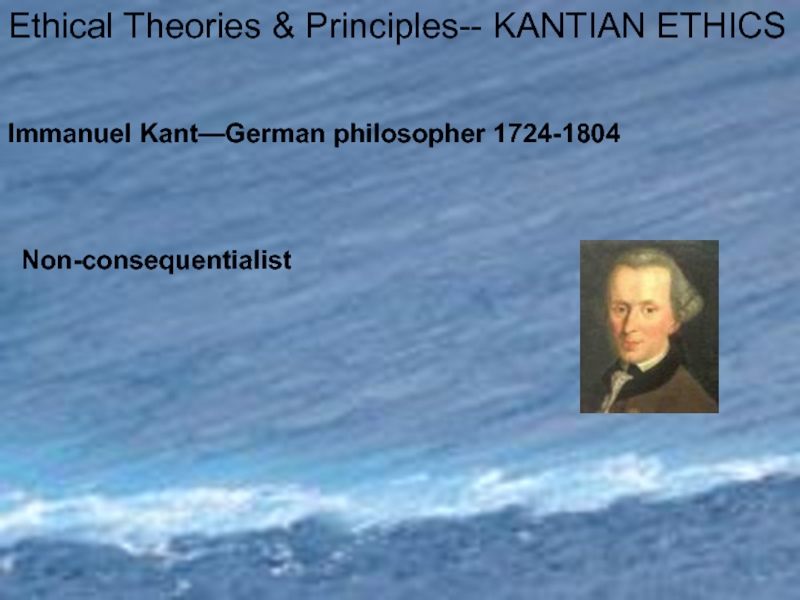
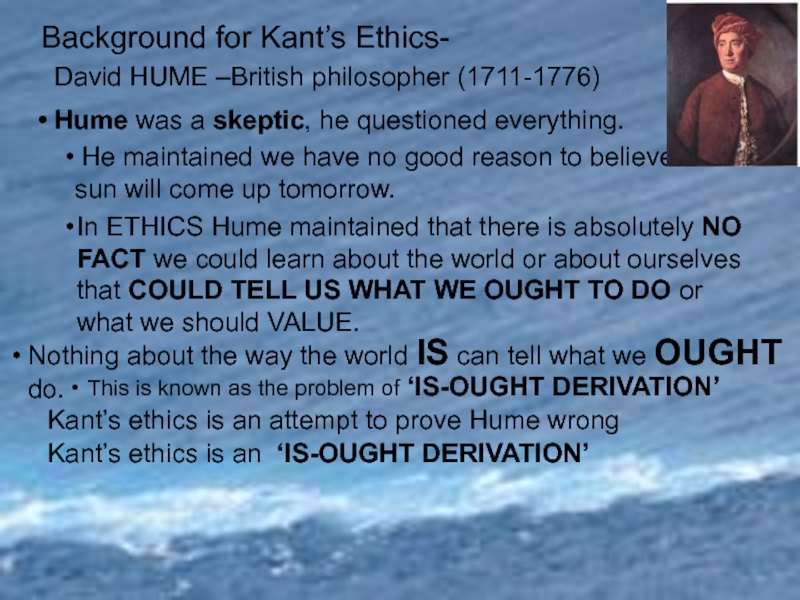
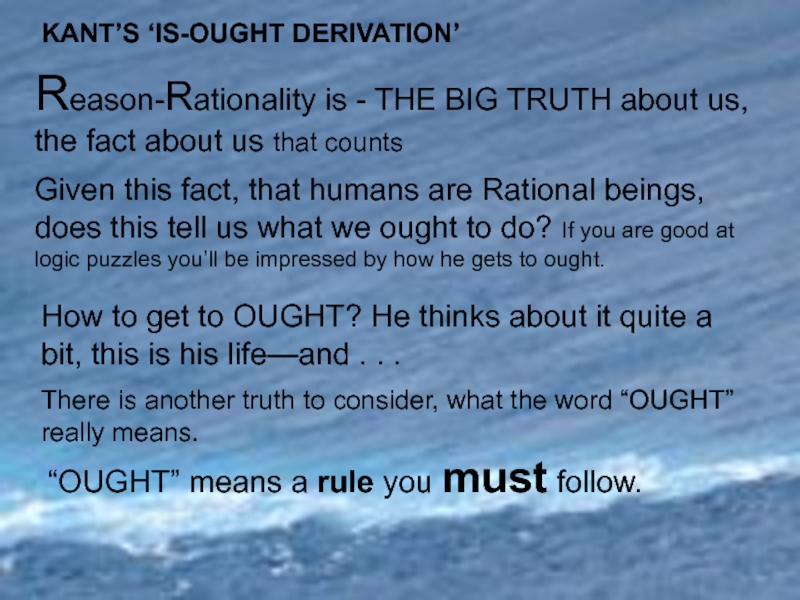
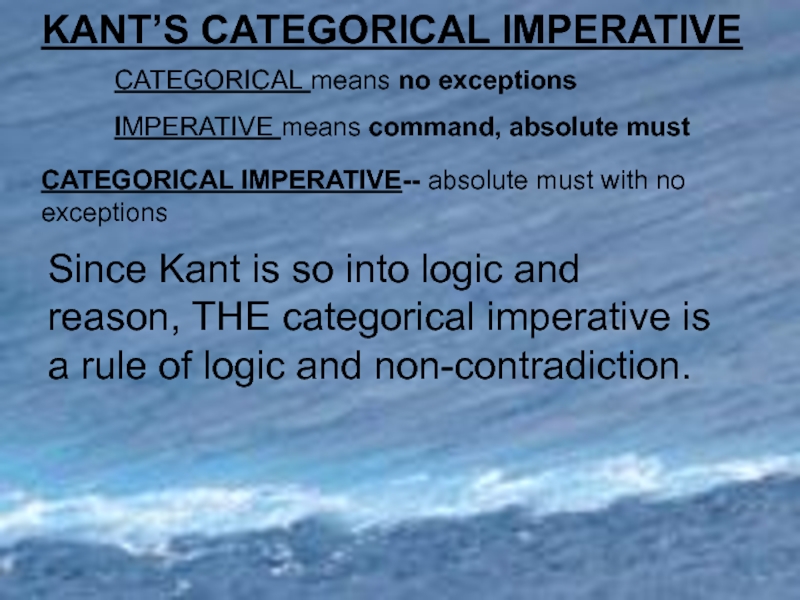
![categorical imperative. [version 1]VERSION 1-- act so that the maxim for what you do you](/img/tmb/4/334894/2f46d4b2b27f097cf7326ccb8f441651-800x.jpg)
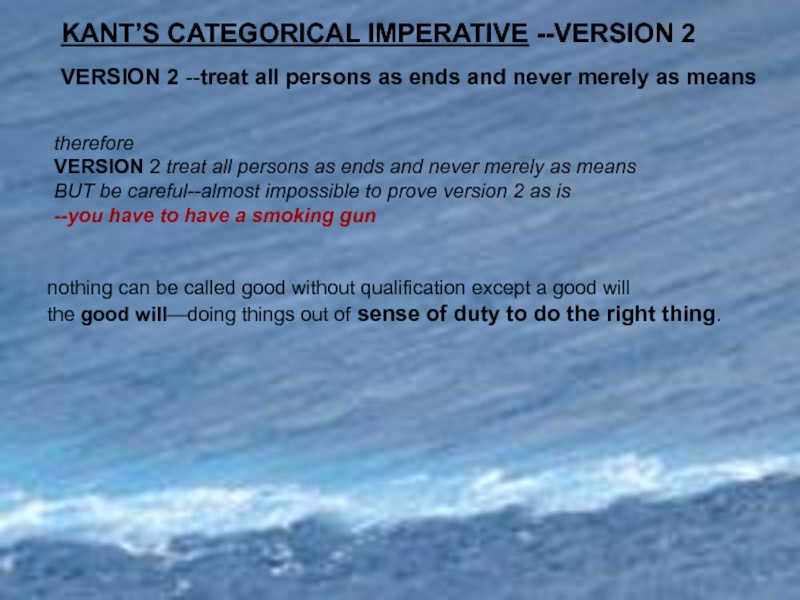
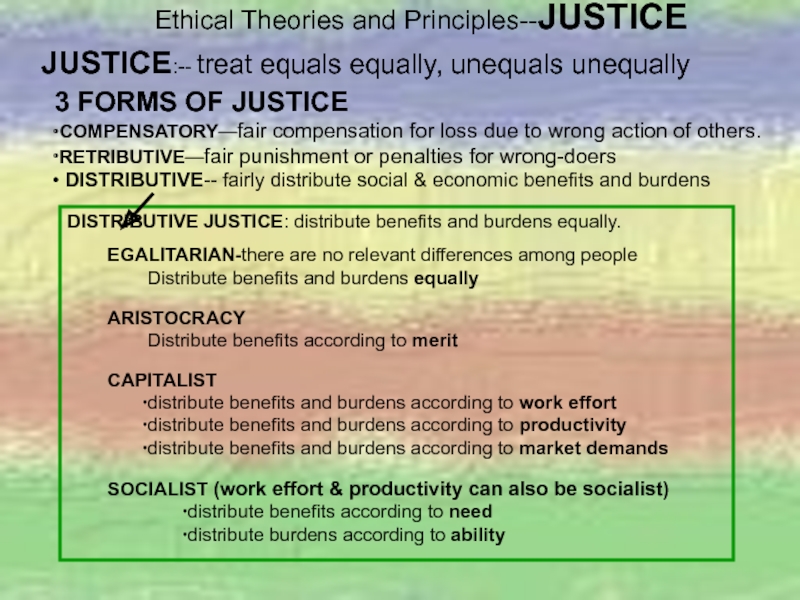
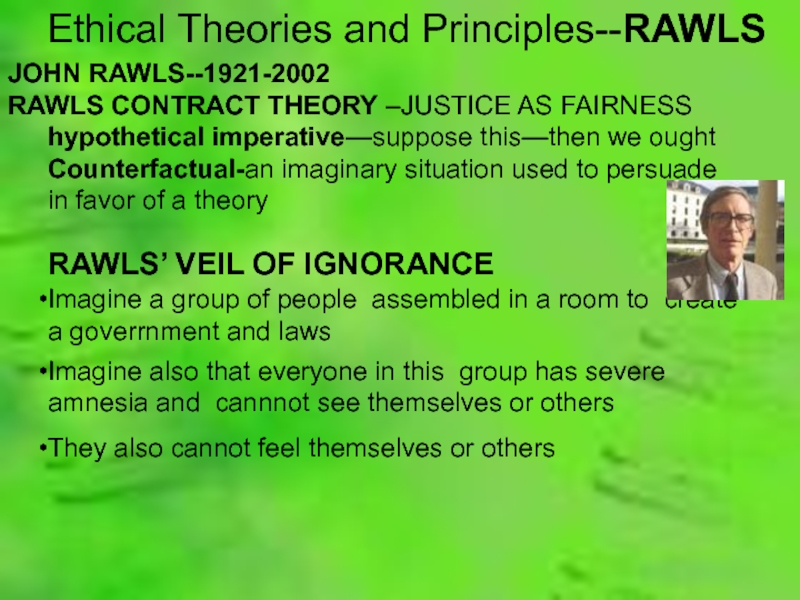
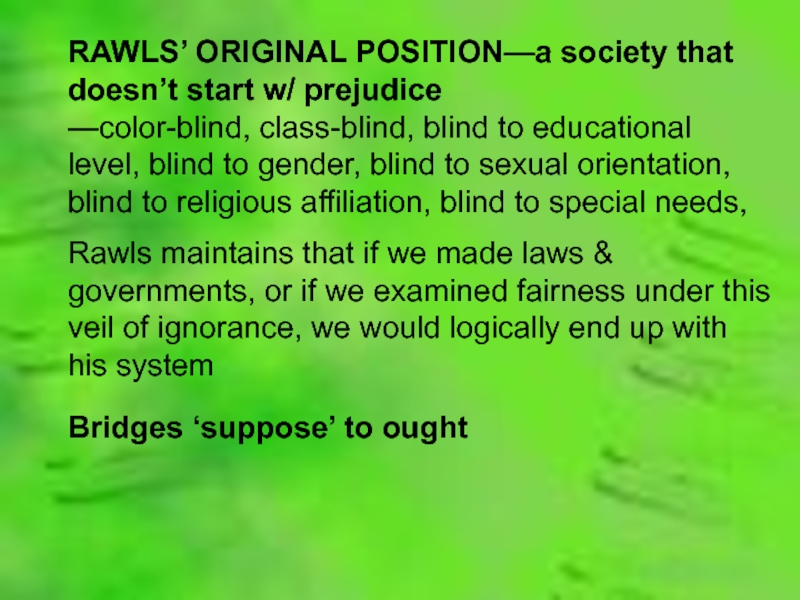
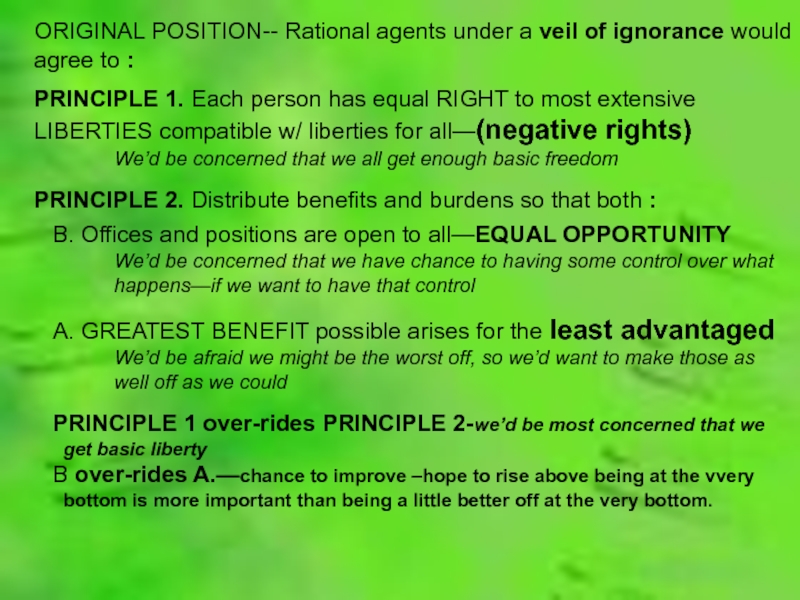
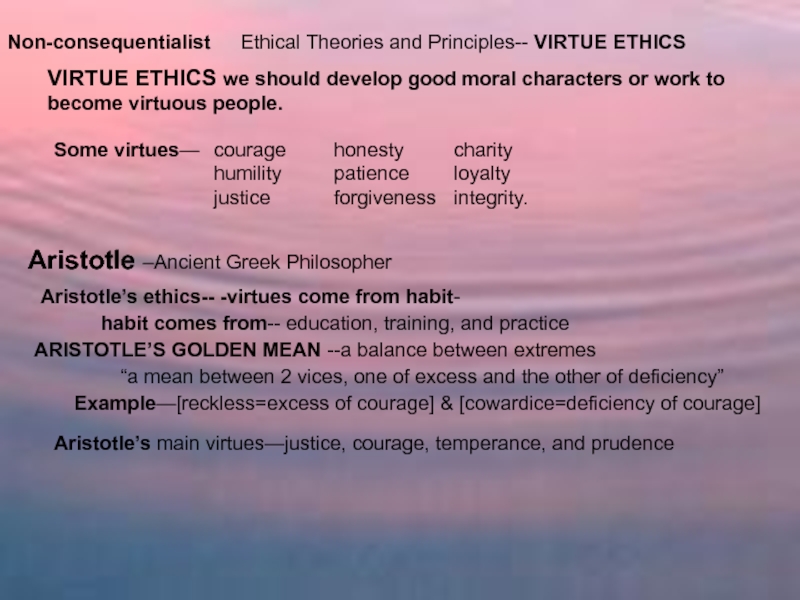
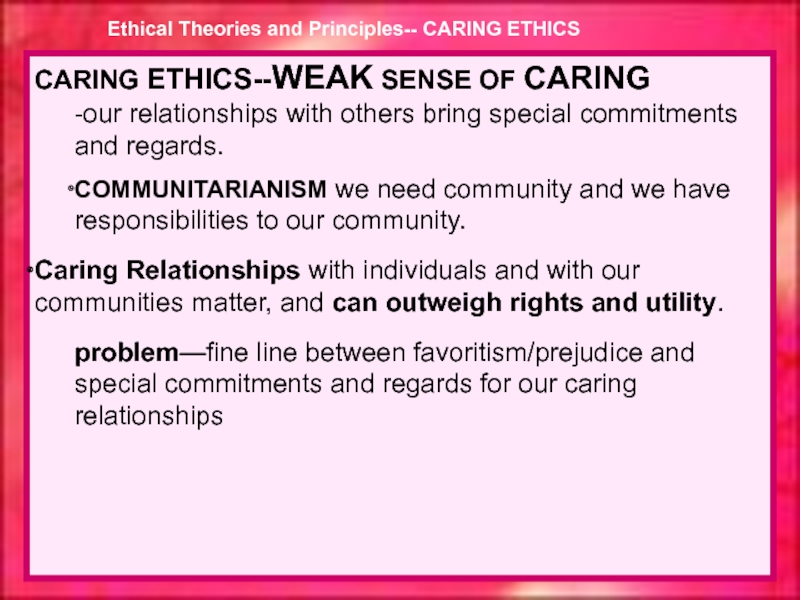
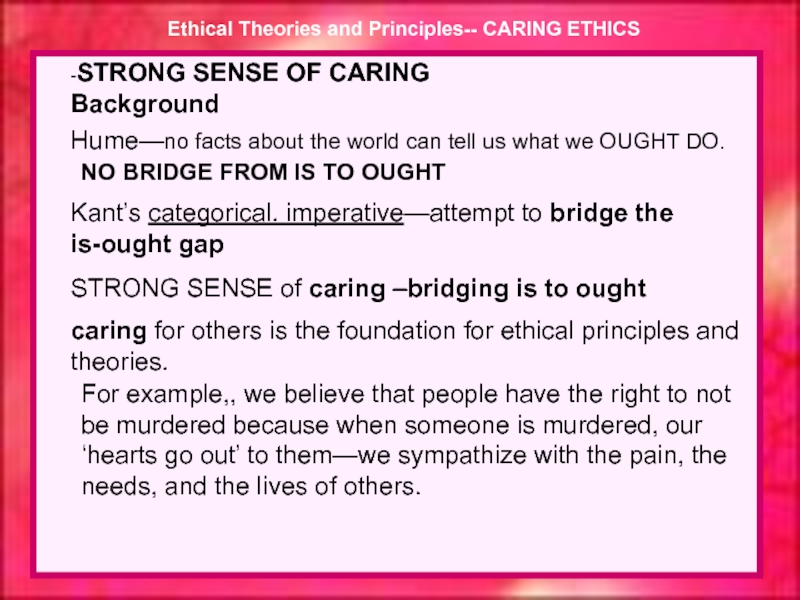
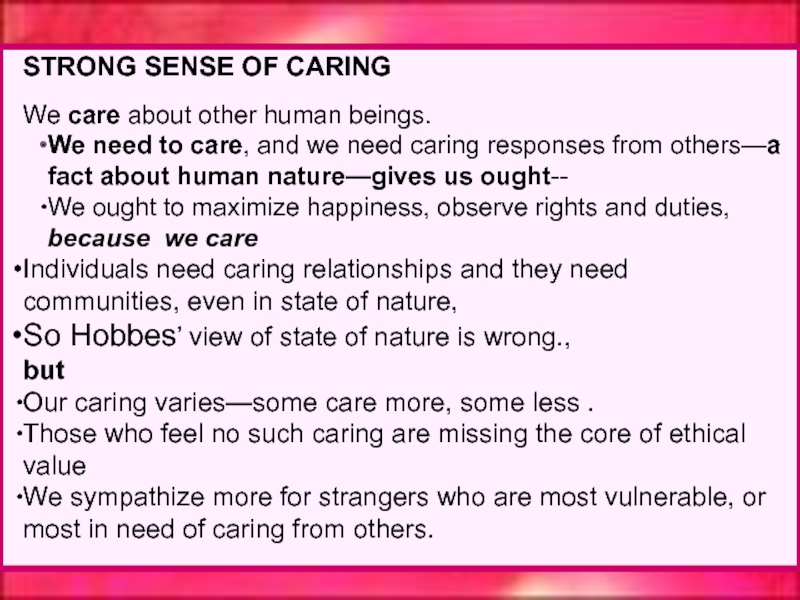
![Adam Smith-[1723–1790] market economy with law of supply and demand is ethicalutilitarian-everyone is better off-but](/img/tmb/4/334894/2c45a07ab74285ce36fb6d6b29b81fff-800x.jpg)

